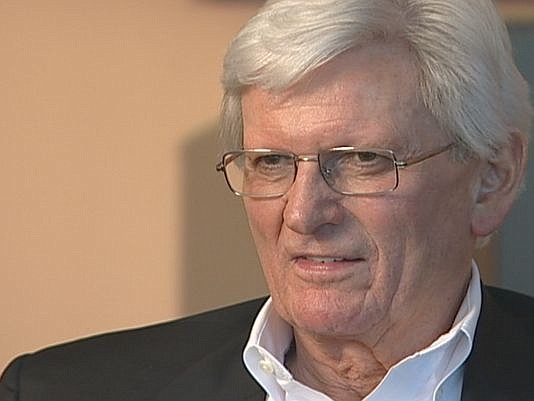Jake Butcher, whose star soared as a Knoxville banker and champion of the 1982 World's Fair but then fell when his business empire collapsed and landed him in federal prison, died Wednesday.
Butcher, 81, whose United American Bank planned one of downtown Chattanooga's tallest buildings before its failure, died after a battle with cancer.
In 1985, the former Democrat candidate for Tennessee governor pled guilty to bank fraud and was sentenced to 20 years in prison. He was released on parole in 1992.
Chattanooga auto dealer Bob McKamey, a longtime friend, gave Butcher a job selling cars at Capital Toyota immediately after his release, he recalled Wednesday.
"He knew so many people, he brought much business to me," said McKamey, who over the years has gained a reputation for giving jobs to people who had served time in prison.
Within the past couple of weeks, McKamey said he and former Chattanooga Mayor Ron Littlefield traveled to Butcher's Atlanta home and spent a few hours with him. He said Butcher couldn't talk but he wrote a lot of notes during the visit.
"He had been the richest man in the world and the poorest man in the world. It's a very sad thing," McKamey said, adding that Butcher had worked at the Lee Highway dealership for a few years.
Littlefield said he had known Butcher for more than a decade, having been introduced to him by McKamey.
"He never got over his interest in politics," Littlefield said. "He was an interesting character, one of the more interesting people I've known in my life. I'm sorry to hear he has passed away."
McKamey, who said he and Butcher had been friends since he was 18 years old, remembered he helped in Butcher's release from prison.
The auto dealer, who was long active in an automotive political action committee, said he received a phone call from a Toyota representative who wanted help with a member of Congress on the powerful House Ways and Means Committee.
The Kentucky congressman, who McKamey declined to name, had sought a red Toyota Celica for Valentine's Day and McKamey's dealership had one in stock.
After the car was delivered, the congressman and McKamey would talk on occasion, and one day the representative asked what had happened to Butcher, knowing McKamey had been seeking his release, the auto dealer said.
The congressman arranged a meeting with a top official with the federal Bureau of Prisons and Mc- Kamey and Butcher's lawyers, and the former banker was released shortly thereafter, McKamey said.
He said he planned to be an honorary pallbearer at Butcher's funeral Saturday.
Butcher bought controlling interest in the former United Bank in Chattanooga for $10 million and merged the bank with the former City Bank of East Ridge to form the United American Bank of Chattanooga. Butcher announced plans in 1982 to build a 28-story tower - the tallest office building in Chattanooga - to house UAB and other offices at Market Street and M.L. King Boulevard. But the plans collapsed along with the failure of United American Bank in 1983.
The downtown block, long known as the "Butcher block" because of Butcher's building plans, was vacant for more than a decade before it was ultimately redeveloped as the 7-story headquarters building for EPB.
Butcher and his brother, C.H. Butcher Jr., were both Union County natives and built their father's banking business in Clinton, Tenn., into a multi- million-dollar financial network that included United American Bank.
Jake Butcher had twice run for governor as a Democrat, and had used his extensive political and business connections to help land the World's Fair in Knoxville in 1982.
The fair was widely considered a success and brought in more than 11 million people over its six-month run. City officials hoped the fair would lead to redevelopment at the site, once a downtown railyard.
Instead, according to media reports, the day after the fair ended, federal agents raided the brothers' multibillion-dollar banking empire. Federal agents padlocked the doors of United American in 1983. Ultimately a slew of banks with total deposits of more than $1 billion failed. Some depositors were insured, but others lost their life savings in what was then the fourth biggest bank failure in U.S. history.
The brothers pleaded guilty to federal charges of conspiracy and bank fraud and both served time in prison before being paroled.
"I got a lot of misery at the end. It was my fault. I have no one to blame but myself," Butcher told WBIR-TV in an interview for the station's coverage of the 25th anniversary of the World's Fair.
While friends acknowledged Butcher's wrongdoings, they also remembered him as generous, funny and loyal.
"Jake Butcher was a personal friend of mine before we were political competitors in 1978 when we both ran for governor of Tennessee," former U.S. Rep. Bob Clement of Nashville said in statement to WBIR-TV. "People make mistakes and I believe we have to forgive, forget and move forward. Jake Butcher loved Tennessee. He particularly loved East Tennessee. He was a successful businessman, entrepreneur and we know what a difference he made with the World's Fair."
C.H. Butcher died in 2002.
The Associated Press contributed to this story.
Contact Mike Pare at mpare@timesfreepress.com or 423-757-6318.
